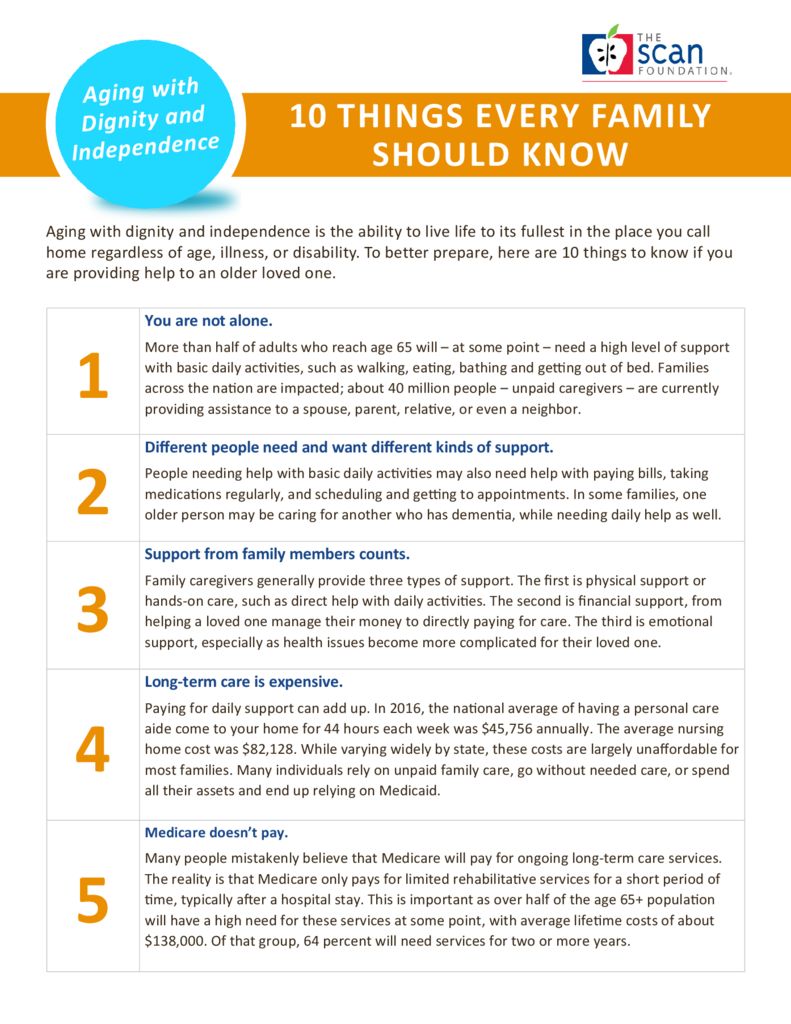10 Things Every Family Should Know About Aging with Dignity and Independence
summary
Someone turning age 65 today has almost a 70 percent chance of needing some type of long-term care (LTC) in their remaining years. Woman need care longer (3.7 years) than men (2.2 years) and while one-third of today’s 65-year-olds may never need LTC, 20 percent (1 in 5) will need it for longer than five years. To better prepare, here are 10 things to know if you are providing help to an older loved one.
Date Updated: 02/02/2013Aging with dignity and independence is the ability to live life to its fullest in the place you call home regardless of age, illness, or disability. To better prepare, here are 10 things to know if you are providing help to an older loved one.
- You are not alone. More than half of adults who reach age 65 will – at some point – need a high level of support with basic daily activities, such as walking, eating, bathing and getting out of bed. Families across the nation are impacted; about 40 million people – unpaid caregivers – are currently providing assistance to a spouse, parent, relative, or even a neighbor.
- Different people need and want different kinds of support. People needing help with basic daily activities may also need help with paying bills, taking medications regularly, and scheduling and getting to appointments. In some families, one older person may be caring for another who has dementia, while needing daily help as well.
- Support from family members counts. Family caregivers generally provide three types of support. The first is physical support or hands-on care, such as direct help with daily activities. The second is financial support, from helping a loved one manage their money to directly paying for care. The third is emotional support, especially as health issues become more complicated for their loved one.
- Long-term care is expensive. Paying for daily support can add up. In 2016, the national average of having a personal care aide come to your home for 44 hours each week was $45,756 annually. The average nursing home cost was $82,128. While varying widely by state, these costs are largely unaffordable for most families. Many individuals rely on unpaid family care, go without needed care, or spend all their assets and end up relying on Medicaid.
- Medicare doesn’t pay. Many people mistakenly believe that Medicare will pay for ongoing long-term care services.The reality is that Medicare only pays for limited rehabilitative services for a short period of time, typically after a hospital stay. This is important as over half of the age 65+ population will have a high need for these services at some point, with average lifetime costs of about $138,000. Of that group, 64 percent will need services for two or more years.
- Talk to your loved ones. Do not wait for a health crisis to start talking about care needs and preferences. Begin a dialogue now to ensure that your loved ones receive high-quality care that aligns with their values and choices. It is important to maintain this conversation over time, as circumstances change. Planning ahead means different things to different people. Maybe it’s setting aside money to pay for future care, or identifying who will bring over weekly groceries and help prep food. Simpler tasks count, too, such as making a list of important contacts (e.g., primary doctor, pharmacy, attorney).
- Talk to your loved one’s doctors. People’s needs change over time. Talk to your loved one’s doctors to make sure that s/he is getting the right care at the right time. Discussions about medications, changing symptoms,and loss of ability to do regular activities are important. For a focused list of important discussions to have with your loved one’s doctors, see 10 Things to Discuss with Your Doctor.
- Build a circle of support. Your loved one may have a chosen representative in the event that s/he cannot make decisions on their own. It is important to engage all people involved, so your loved one’s values and preferences can be honored. If you are providing support to a loved one, make sure that you are receiving the care and rest you need, too. The sooner you begin to build your network of support, the better.
- We all want to age with dignity, choice, and independence. This means being able to live life to the fullest, regardless of our daily abilities or physical limitations. Find out how your loved one defines living with dignity, choice, and independence, and have that be part of your master plan for securing their care and services. Also, revisit this conversation as circumstances change.
- Your voice is important. Decisions are being made at the state and federal levels that could impact services available to you and your loved ones. Stay informed, get involved, and take action. Learn about what is being done to ensure that as Americans grow older, a healthy network of supports and services is available for those who need it. Talk with your elected officials about what kind of support you want as you grow older. You can also get regular updates by visiting our website, signing up for our Buzz e-newsletter, and following us on Twitter.
Continue Reading
This policy brief provides an introduction to The SCAN Foundation’s CLASS Technical Assistance Brief Series, which explores many of the critical issues to be considered for successfully implementing CLASS.
This policy brief describes the broad needs of individuals with disability and the wide range of supportive and environmental solutions that can allow for the most independent living possible. It suggests how findings on social and environmental supports for individuals with disability can inform implementation of CLASS.
This policy brief provides background on the historical development of benefit eligibility triggers in the private long-term care insurance market. Understanding how these triggers came into being can provide important information to those charged with implementing the CLASS Plan.


